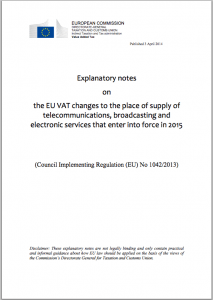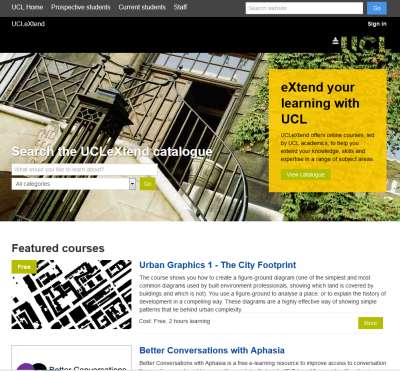Online courses as digital services; taxes and teachers
By Matt Jenner, on 24 April 2015
Fully online courses, with non-matriculated learners, are classified as ‘digital services’ and their income is subject to VAT (currently 20%). This levy applies to the fees charged. You don’t have to add tax if you add teachers instead; but does it all add up?
Types of learners and courses
Let’s make the first point crystal clear – we’re talking about non-matriculated learners here. These kind of courses are generally branded as CPD and Short Courses; anything offered which you learn online but do not become a registered student of that institution or provider.
The rules affect only fully online courses. If your course is face to face or blended / hybrid / mixed mode delivery, i.e. it has a face to face component, then tax does not apply. Your fully online course might also be known as distance learning – but it means there’s no physical fixed environment in which learners attend and they do not get awarded university credits or a degree.
Credit bearing degree or Face to face teaching = not taxed.
E-services and Digital Services
There is a UK Gov definition of what constitutes as an ‘e-service’ or ‘digital service’. These are the terms the UK Government use when defining a broad catalogue of things ‘electronically supplied’. The definition of ‘electronically supplied’ “covers e-services which are automatically delivered over the internet, or an electronic network, where there is minimal or no human intervention” (Gov.uk). The definition is not comprehensive, and judgement is required from the provider. And I must add if you’re unsure please consult HMRC on Vat2015.contact@hmrc.gsi.gov.uk or your tax/financial/legal advisors.
Included on the Gov.uk site is a list of examples to help clarify what might be classified as an e-service, or digital service:
| Service | e-service | Electronically supplied? | Covered by the new rules |
| Pdf document manually emailed by seller | Yes | No | No |
| Pdf document automatically emailed by seller’s system | Yes | Yes | Yes |
| Pdf document automatically downloaded from site | Yes | Yes | Yes |
| Stock photographs available for automatic download | Yes | Yes | Yes |
| Live webinar | No | No | No |
| Online course consisting of pre-recorded videos and downloadable pdfs | Yes | Yes | Yes |
| Online course consisting of pre-recorded videos and downloadable pdfs plus support from a live tutor | Yes | No | No |
| Individually commissioned content sent in digital form eg, photographs, reports, medical results | Yes | No | No |
| Link to online content or download sent by manual email | Yes | Yes | Yes |
I think what’s important to note are the two above which are highlighted (and that apparently they are not classified electronically supplied – this bit is important).
The European Commission provides further clarification on the definition of a digital service in their ‘Explanatory notes on the EU VAT changes to the place of supply of telecommunications, broadcasting and electronic services that enter into force in 2015’ publication (EC – pg. 85).
There’s a lot to digest here, but their overview is:
‘Electronically supplied services’ as referred to in Directive 2006/112/EC shall include services which are delivered over the Internet or an electronic network and the nature of which renders their supply essentially automated and involving minimal human intervention, and impossible to ensure in the absence of information technology.
Emphasis added – but it helps make my point; if you’re running online courses just be cautious around full automation. This would be defined as a self-paced, self-assessed (or automatically assessed) course with no critical teacher-based human input (i.e. it’s not automated). The EC are pretty clear that their “explanatory notes are not legally binding and only contain practical and informal guidance about how EU law should be applied on the basis of the views of the Commission’s Directorate General for Taxation and Customs Union” (EC report – P1). Pretty reasonable; we need to interpret and not jump to incorrect conclusions.
My interpretation of digital services is there’s been a digital transformation to business this millennium and it is right that a TAX is applied to businesses profiting from this. I see it as if you’re selling something, we want a slice of the profits to prop up the economy – and this is totally fair. For digital services I imagine it’s to do with scale; Apple iTunes can sell a [nearly] unlimited number of MP3 files, no problem. Professor Famous can’t teach an unlimited number of people, at some stage they’re going to crack, the quality will drop, the interactions fail, and something needs to change.
As the rules are interpretative it seems from the new guidance that if you provide human-based interaction between learners and teachers (or facilitators) then you’re less likely to be classified as a digital service. Surely it’s therefore better to not say ‘avoiding tax’ but instead ‘adding value’ by adding teachers?
Well, let’s try some simple calculations:
Income = course fees – expenses (I=C-E)
I run a course which teaches 20 people, they each pay £1000 (it’s pretty good)
Example A – Fully online course
- Fees = £20,000 (20 x £1,000)
- Expenses = £4,000 (Tax on income of £20,000)
- Income = £16,000 (£20,000 – £4,000)
Example B – Facilitated online course
- Fees = £20,000 (20 x £1,000)
- Expenses = £4,000 (paying a teacher)
- Income = £16,000 (£20,000 – £4,000)
- Bonus – someone just got paid £4,000 to teach 20 people something
Relax: There’s always tax
Tax is inevitable, and perfectly acceptable – we need it. The point is you could’ve weighed up paying a teacher instead and likely boosted the learning experience. In Example B less (or more) than £4,000 could’ve been paid to a teacher; so the net income is still reduced – but it’s gone somewhere else. The teacher will still pay some level of income tax, so let’s not get too far into an anti-tax agenda.
Also the fees could’ve also been much lower, but even at £100 each, the £400 spent on a teacher still seems like a solid investment. It does make checking your numbers a good idea; i.e. what’s a sustainable income required to keep this going / scale accordingly for projected fee:learner levels.
It’s not avoiding, or saving, it’s enhancing learning with teachers!
Learning with peers, and a teacher is a good thing. There is a vast array of data, research-informed evidence and general ‘feeling’ that teachers are needed. Quite frankly if teachers were not needed, they’d probably have been replaced by computers as quickly as possible. Obviously there is a place for self-directed and peer-to-peer learning; but that’s not the point I’m making – all that good stuff can still exist. This post is merely indicating the situation regarding tax and teaching. Take away the teacher, add the tax. It’s illogical, to a large extent.
Closing thoughts
If you’re offer online courses as a digital service, and paying VAT, you might just want to reflect on this. If you consider adding in a teacher; it’ll likely improve the dynamic, enhance the learning and maybe even save you some money. But also remember one other thing; this article is written by an expert in education and technology, not a tax advisor. If you take this as tax advice, you need to re-evaluate your sources of knowledge. You should then browse HMRC.org and GOV.UK and speak to experts! Also this post is not the view of UCL – and if it gets me in trouble it might disappear pretty quickly…
I wrote this because I was genuinely surprised that tax is a variable factor for online courses. Tax is important, as is good education. I trust being slightly more informed you’ll make the right choices. I’d also welcome a debate on my interpretation of all this.
 Close
Close






